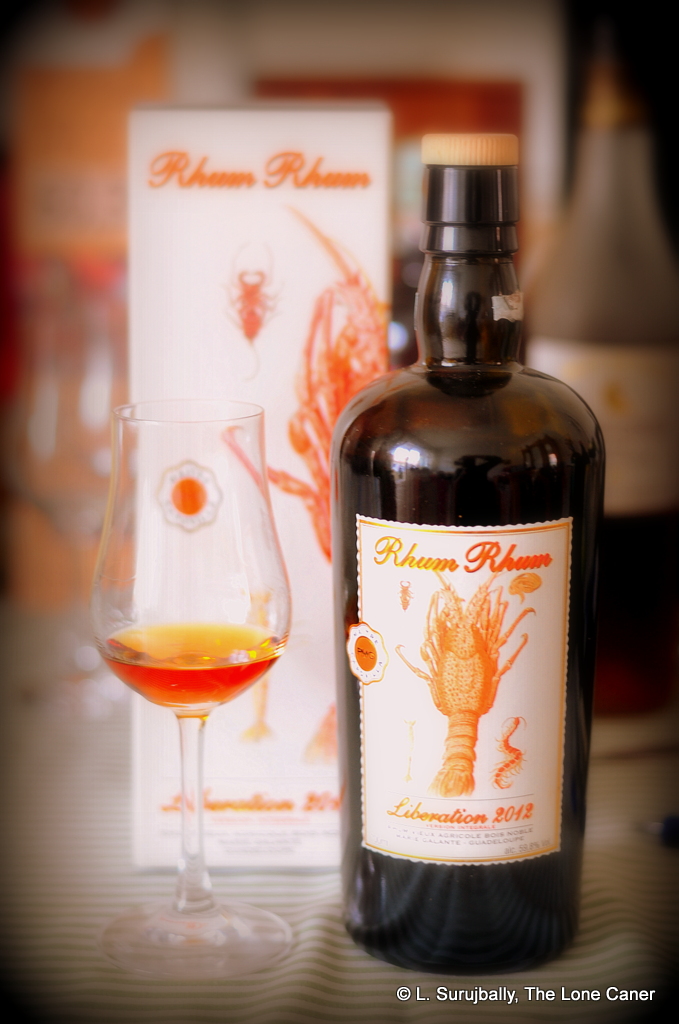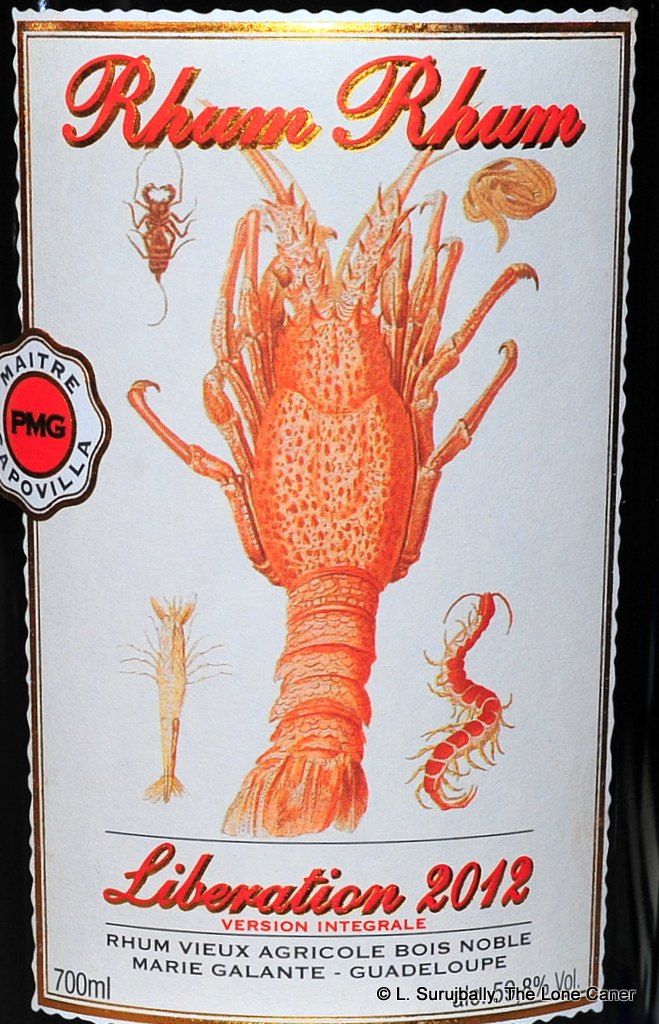
One of the best five year old rhums ever made, and a showcase for the wonderful directions the profile of a rhum can take.
If I was underwhelmed by the “standard” 45% 2012 Liberation, and shrugged at the 2010 version (both rated around low eighties scores), let me assure you that the 2012 “Integrale”, bottled at a mouth watering 59.8%, is a beast of an entirely different colour. If your sojourn into agricoles ever takes you to Guadeloupe rhums, you could do a lot worse than stop a while at the small southern island of Marie Galante, where Bielle and Gianni Capovilla have their establishment. Because this five year old blasts even its own siblings right out of the water.
The bottle and its cardboard enclosure – which boast the picture of a lobster and other creepy crawlies in a reference I’m sure I’m not clever enough to understand, but which is supposed to speak to appropriate food pairings with the rum – make no notes on the age statement, but running around the internet assures me it’s a five year old (as if the title didn’t already suggest it), aged in white oak barrels that once held sauternes white wine…Chateau d’Yquem from the domaine of Leflaive for those of you who are interested in such things. The rhum derived from undiluted cane juice fermented for around ten days, which is quite a long time, relatively speaking – most distillers don’t ferment for more than five days, and many for less. Double distillation took place in Bielle as part of a collaboration between Gianni Capovilla and Luca Gargano (a new still apparatus was built in Bielle’s facility with sugar coming from there), using small copper pot stills designed by Mr. Capovilla and built by the German firm Muller, before being set to age. And of course, it was utterly unmessed with – no sugar, no dilution, no additives of any kind.
Because Guadeloupe and its associated islands like Marie Galante has never sought the AOC certification, they seem to feel a childlike enthusiasm for going in any direction they feel inclined to on any particular day. Here that succeeded swimmingly. The nose presented an amazingly strong, fruity and clean profile right off the bat…plums and rich elderberries (of the kind Mrs. Caner doses me with every time I get a cold), crisp apples and pears, very little citrus of any kind, grassy and vegetal and almost perfumed. Very mildly heavy, well balanced to the senses. To say I was impressed might be understating matters: it was something like a slinky black cocktail dress mixed up with a Viennese ball gown, leavened with a helicopter gunship in full combat mode: three parts sensuality, two parts aggro and one of prurient decorum. Right out of the gate, this rhum was simply ludicrous: nothing this young should be this good. And while it was younger than the Compagnie des Indes Guadeloupe, it was rounder, fruitier and more complex…in point of fact, it reminded me more of the J.M. 1995 which was three times older.
 This amazing mix of class and sleaze and style continued without missing a beat when I tasted it. Sure, 59.8% was something of a hammer to the glottis but man, it was so well assembled that it actually felt softer than it really was: I tried the Liberation on and off over four days, and every time I added more stuff to my tasting notes, becoming more impressed each time. The dark gold rhum started the party rolling with plums, peaches and unripe apricots, which provided a firm bedrock that flawlessly supported sharper tangerines and passion fruit and pomegranates. As it opened up (and with water), further notes of vanilla and mild salted caramel came to the fore, held together by breakfast spices and a very good heat that was almost, but not quite, sharp – one could barely tell how strong the drink truly was, because it ran across the tongue so well.
This amazing mix of class and sleaze and style continued without missing a beat when I tasted it. Sure, 59.8% was something of a hammer to the glottis but man, it was so well assembled that it actually felt softer than it really was: I tried the Liberation on and off over four days, and every time I added more stuff to my tasting notes, becoming more impressed each time. The dark gold rhum started the party rolling with plums, peaches and unripe apricots, which provided a firm bedrock that flawlessly supported sharper tangerines and passion fruit and pomegranates. As it opened up (and with water), further notes of vanilla and mild salted caramel came to the fore, held together by breakfast spices and a very good heat that was almost, but not quite, sharp – one could barely tell how strong the drink truly was, because it ran across the tongue so well.
The fade was similarly impressive, lasting as long as the wait of an errant child for a father’s inevitable punishment: here the soft, firm roundness of the taste gave way to something drier and more assertive, yet this was not unpleasant by any stretch, and gave me final gifts of lemongrass, light brine, teriyaki, and more of those prunes, well dialled back. In fine, a wonderful rhum all ‘round, and for its price, I think it’s a steal, five years old or not. It adheres to all the style markers of the French West Indies, and then goes just a little bit further.
It’s just about impossible to get away from Velier and Mr. Gargano these days. This is not to take anything away from Gianni Capovilla, by the way, because he’s the architect who understood and built on the dream that Luca espoused with this remarkable agricole rhum and so real credit is due to him also. But think about it: a decade ago just about nobody outside Italy ever heard of Velier or Luca, and yet today you can’t get into a discussion of pure rhums without his name popping up.
That may be the key to why he has become so synonymous with pure rhums. It’s not that he makes anything, produces anything, or distils anything. What he does is choose. He chooses the best of what’s out there in service to his personal values and and ideals, collaborates with the roneros and producers to share that vision…and then he brings the results to the attention of the world. More, he articulates what is possible for everyone else. Not all of his work succeeds, of course, but much of it does.
And as we followed the man’s outturn through the years, we all saw the signposts: markers on the road of rhum discovery, making our own sojourn that much more exciting, that much more interesting. Offhand, I think of the dead serious Skeldon 1973 and PM 1974, the dour Caronis, the fine depth of the Damoiseau 1980, joined by the ribald insouciance of the Clairins…and now, by this lovely exemplar of Capovilla’s art. I think I’ll linger here for a while, if you don’t mind, just to savour it some more.
(#264 / 89/100)
Other notes
- Outturn 1420 bottles
- The “Liberation’ in the name refers to the liberation of the spirit from the barrels, and according to Cyril of DuRhum, the “Integrale” means “fullproof”.
Thank you for the interesting review! Do you think the Liberation series will be a valuable collectors item in the future? I have the opportunity to get a few bottles of the 2012 and 2015 Integrale for quite a good price and ask myself if I should take the risk of investing a bit…
Depends on your timeline and outturn. In twenty years, sure. A rule of thumb I use is that if 100 bottles were issued, I snap it up now, but I walk away if it was 10,000. The one i review here had 1400 or so.
It also depends on your capacity and tolerance for risk in what is, at end, something of a niche market. If pressed, I’d say its value will go up, sure, but nowhere near the appreciation of older Veliers like the Skeldons, or early Samarolis.
There are several sources in the net that claim only 1420 bottles of the 2012 Vision Integrale 59.8 were released (Velier.it and others), don’t know for the 2015, yet, but I assume it might be similar. I think I take the risk and get two of each. Maybe one more for trying it 🙂 The boxes and bottles are beautiful for display and if everything goes wrong I can still drink them.
Thank you for the fast answer,
Regards from Germany,
Dino
No two years later the prices for this release have almost tripled. On ebay the 2010 version even scored five times the price of what I paid for it. So it was a good investment after all! The biggest risk I have to face is my own thirst 🙂
Hi Lance,
Managed to get a bottle of this last year and finally ‘liberated’ it from the bottle last week. It is a magnificent rum considering it’s age. I guess it showcases the skill of Mr. Capovilla. I tried the 2015 version last year and was equally impressed. I hope Mr. Capovilla continues with his good work.
Cheers,
Karl